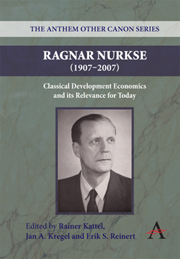Book contents
- Frontmatter
- Contents
- Preface
- Title in the series
- 1 The Relevance of Ragnar Nurkse and Classical Development Economics
- 2 Life and Time of Ragnar Nurkse
- 3 Nurkse and the Role of Finance in Development Economics
- 4 Early Development Theory from Sun Yat-sen to Ragnar Nurkse
- 5 The Roots of Unequal Exchange: Mihail Manoilescu and the Debate of the 1930s
- 6 Nurkse and the Early Latin American Structuralists: A Reflection on Development Theory, Industrialization and their Relevance Today
- 7 Lewis, the Long Wave and Industrialization in the Periphery
- 8 Ragnar Nurkse and the Law & Economics of Development
- 9 Ragnar Nurkse's Development Theory: Influences and Perceptions
- 10 Nurkse meets Schumpeter: Is Microfinance a ‘Silver Bullet’ to Economic Development?
- 11 Stockpiling of International Reserves and Development: a Misguided Link
- 12 International Currency Experience and the Bretton Woods System: Ragnar Nurkse as Architect
- 13 Some Reflections on Nurkse's Patterns of Trade and Development
- 14 India and Development Economics: External Influences and Internal Responses
- Notes
3 - Nurkse and the Role of Finance in Development Economics
Published online by Cambridge University Press: 05 March 2012
- Frontmatter
- Contents
- Preface
- Title in the series
- 1 The Relevance of Ragnar Nurkse and Classical Development Economics
- 2 Life and Time of Ragnar Nurkse
- 3 Nurkse and the Role of Finance in Development Economics
- 4 Early Development Theory from Sun Yat-sen to Ragnar Nurkse
- 5 The Roots of Unequal Exchange: Mihail Manoilescu and the Debate of the 1930s
- 6 Nurkse and the Early Latin American Structuralists: A Reflection on Development Theory, Industrialization and their Relevance Today
- 7 Lewis, the Long Wave and Industrialization in the Periphery
- 8 Ragnar Nurkse and the Law & Economics of Development
- 9 Ragnar Nurkse's Development Theory: Influences and Perceptions
- 10 Nurkse meets Schumpeter: Is Microfinance a ‘Silver Bullet’ to Economic Development?
- 11 Stockpiling of International Reserves and Development: a Misguided Link
- 12 International Currency Experience and the Bretton Woods System: Ragnar Nurkse as Architect
- 13 Some Reflections on Nurkse's Patterns of Trade and Development
- 14 India and Development Economics: External Influences and Internal Responses
- Notes
Summary
Nurkse, Early Development Theory and Modern Monoeconomics
Ragnar Nurkse was part of a group of early theorists of economic development who questioned orthodox Ricardian trade theory as the basis for development policies: ‘In many of the less developed countries today the dominant practical question is whether the available investment funds … should be used to provide activities specialized along lines of comparative advantage internationally or diversified so as to provide markets for each other locally.’ He noted that this ‘clash of prescriptions on the policy plane reflects … a gap between the neoclassical allocation economics and … growth economics’ (Nurkse 1961b, 235–6). The emphasis on growth economics engendered a debate over whether ‘balanced’ or ‘unbalanced’ growth was the best strategy for developing countries to support growth through industrialization. In difference from modern discussions of development, there was a general agreement amongst economists that industrialization was the most efficient means of supporting economic development.
Ragnar Nurkse, along with Paul Rosenstein-Rodan, was the most important and influential advocate of ‘balanced’ growth as a means to support the industrialization of ‘undeveloped’ (to use Oscar Lange's terminology; Lange 1946) economies. It was taken as given that a developed economy was an industrial economy. Nurkse and Rosenstein-Rodan supported balanced growth with what might be called ‘classical’ arguments concerning long-run determinants of the interaction between demand and supply, in particular those advanced by Allyn Young and Josef Schumpeter in the 1920s, joined to an historical analysis of the changing structure of international trade and payments in the twentieth century.
- Type
- Chapter
- Information
- Ragnar Nurkse (1907–2007)Classical Development Economics and its Relevance for Today, pp. 53 - 78Publisher: Anthem PressPrint publication year: 2009



